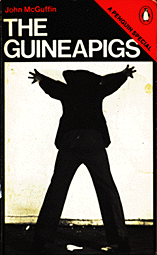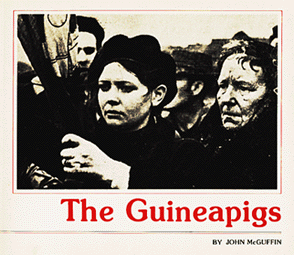

 |
 |
by John McGuffin (1974, 1981)
Originally published in London by Penguin Books, 1974. Paperback, 192 pp. Out of Print.
2nd edition Minuteman Press, San Francisco, 1981. Paperback, 75 pp. Out of Print.
The first edition by Penguin sold 20,000 copies and was banned after one week by the British government and Reginald Maudling. The 2nd edition in 1981 updated the fate of the victims and named the torturers, but omitted two chapters from the original edition.
A complete compilation of both editions is now here available for the first time. Feel free to download these pages, but if you decide to do so we would like to ask you to make a donation to Irish Resistance Books, in order that IRB can publish further works. (Note: We are not in receipt of any grants or Art Council funding.)
You may not edit, adapt, or redistribute changed versions of this for other than your personal use without the express written permission. Redistribution for commercial purposes is not permitted.
The Guineapigs in the title were fourteen Irish political prisoners on whom the British Army experimented with sensory deprivation torture in 1971. These 'techniques' are now outlawed, following Britain's conviction at the International Court of Human Rights at Strasbourg, but have been exported and used by Britain's allies throughout the world. This book first appeared in 1974, published by Penguin Books in London. It sold out on its first print run and was then abruptly taken off the market following pressure from the British Government.
In Ireland in 1971 there was deliberate and careful use of modern torture techniques, not merely to get information but to perfect the system of Sensory Deprivation for use against civilians. The author, an ex-internee himself spent two years researching the book following his release from Crumlin Road jail where he had been held without charge or trial. In this new edition he is at last able to name the torturers and those responsible for this sordid episode in British Imperial history. No member of the British Army or the Royal Ulster Constabulary has ever been convicted of torture or brutality to prisoners, although the Government has been forced to pay out over $5 million in compensation to torture victims.
This re-issue of 'The Guineapigs' is dedicated to the blanket men in Long Kesh concentration camp and the women political prisoners in Armagh jail. 'Na reabhloidi Abu.'
This book could not have been written without the active help and advice of many people. Firstly I must thank the 'guineapigs' themselves, and in particular Jim Auld, Pat Shivers and Paddy Joe Mc Clean. A large debt is also owed to the Association for Legal Justice, Amnesty International (and in particular Richard Reoch) and the British Society for Social Responsibility in the Sciences. For help on the medical and psychological aspects of SD I am particularly indebted to Dr. Tim Shallice of the National Hospital and Dr. Pearse O'Malley of Belfast.
As for the rest, many have preferred that they remain anonymous, but special thanks must go to Judy Smith, Frank Doherty, Johnathan Rosenhead, Kevin Boyle, Hurst Hannum, Father Denis Faul, Margaret Gatt, Ian Franklin, Eamonn Kerr, Billy Close, Joe Quigley, Noelle, Hugh, Judith and, of course, R. W. Grimshaw. I am grateful to Gil Boehringer for permission to use part of his work for Appendix I.
Finally, I must thank Marie for her typing and Fra for putting up with it all.
JOHN McGUFFIN
Belfast, February 1974
Torture and brutality – or 'ill-treatment' as Sir Edmund Compton would prefer to call it – are as old as war itself. Mankind has expended centuries of research in trying to devise newer and more bestial ways of extracting information from reluctant witnesses or causing lingering and painful deaths.
The purpose of this book, however, is not to deal with torture in general. It is specific. It deals with the treatment meted out to fourteen Irishmen by the British 'security forces' in the period from August to October 1971. It is not written to show that this treatment was more barbaric than that practised by the British Army upon hundreds of other Irish internees/ detainees/ political prisoners since 1969 nor upon the victims of the ten colonial actions undertaken by the British since the Second World War. Instead it is an attempt to show how these men were selected as unwilling and unwitting subjects upon whom Army psychiatrists, psychologists and 'counter-terrorist strategists' could experiment in that particular field known as 'SD' – Sensory Deprivation. That the experiment was a dismal failure, both from a military and a propaganda point of view, mattered little to the men in the War Office. Worse still, the fact that several of the men used were literally driven out of their minds and still today, over two years later, suffer from severe mental traumas which they will carry with them to the grave has evoked not a shred of remorse, admission of guilt, or apology, let alone an attempt at recompense – though how do you give a man back his mental health? – from the 'mother of parliaments'. This book is an attempt to tell these men's story, the story of the 'guineapigs'.
| Chapter 1: | 'Ill-Treatment' – A Brief History |
| Chapter 2: | What is Sensory Deprivation? |
| Chapter 3: | The Swoop – The First Forty-eight Hours |
| Chapter 4: | The Experiment |
| Chapter 5: | The Compton Report |
| Chapter 6: | Replay |
| Chapter 7: | Parker: Cover-up MK2 |
| Chapter 8: | The After-effects |
| Chapter 9: | Down on the Killing Floor |
| Chapter 10: | Postscript – Torture in the World Today |
| Tailpiece | |
| Afterword | |
| Appendix I: | Memorandum of Modest Proposals for Preventing the Spread of Torture and Ill-treatment in Northern Ireland |
| Appendix II: | Proposed Draft for a UN Resolution on a Convention on Torture and the Treatment of Prisoners |